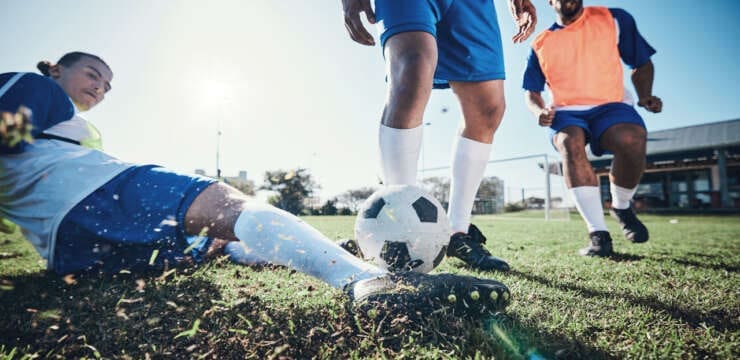
Table of Contents
How Sports Injuries and Car Accidents Disrupt Health—and How Coaching, Chiropractic, and Integrative Care Support Healing

Introduction: When the Body Faces Impact
Whether it’s a fall on the field or a sudden jolt in a car crash, the result is often the same—muscles, joints, and nerves experience trauma that throws the body off balance. Sports injuries and motor vehicle accidents (MVAs) may seem unrelated, but both involve high-impact forces that strain or damage the body in similar ways.
The recovery journey also shares common ground. Both types of injuries benefit from a personalized, whole-body approach that blends chiropractic care, functional movement training, massage therapy, nutritional support, and health coaching. When guided by professionals who understand the connections between physical trauma and long-term health, recovery becomes more than just healing—it becomes transformation.
National Highway Traffic Safety Administration, n.d.
High-Impact Forces and Soft Tissue Injuries
Sprains, strains, and muscle tears are among the most common injuries seen in both athletes and car crash victims. These injuries often result from sudden stops, twisting motions, or direct blows—such as falling during a game or bracing for impact during a collision.
Sprains (ligament damage) and strains (muscle or tendon injuries) often cause pain, swelling, limited movement, and weakness. While rest and ice are helpful, these injuries heal best when supported by a comprehensive recovery plan that includes movement therapy, chiropractic care, massage, and nutrition.
Clinics like TheraSport, [The Smith Clinic], and Dubuque Physical Therapy stress the importance of active rehabilitation and not simply waiting for time to pass. Health coaches play an essential role here, helping patients stay consistent with stretching, recovery routines, and nutrition to speed healing.
Neck and Brain Injuries: More Than Just a Bump
Whiplash and concussions are two of the most overlooked but serious consequences of both athletic trauma and MVAs. A sudden acceleration-deceleration motion—like a tackle or rear-end crash—can injure the brain, cervical spine, and surrounding soft tissues.
Symptoms of these injuries can be subtle at first, including fatigue, memory problems, dizziness, or irritability. According to the Skinner Law Firm and Visible Body, even minor brain injuries require close monitoring and guided recovery.
Integrative care can include chiropractic adjustments, nervous system regulation techniques, and coaching to support brain and emotional recovery. Addressing stress, sleep, hydration, and diet is just as critical as restoring physical alignment.
Structural Injuries: Bones, Dislocations, and Alignment
Fractures, dislocations, and spinal misalignments can occur in both sports and car accidents. Ankles, knees, wrists, and shoulders are most commonly affected due to falls, awkward movements, or blunt force.
The Advanced Orthopedic Center highlights the need for guided rehabilitation after such injuries. Recovery involves more than immobilization—it requires gentle reactivation of muscles, postural retraining, and flexibility work.
Health coaches can support this process by helping patients make lifestyle adjustments, manage movement plans at home, and maintain consistent habits that reduce the risk of re-injury.
Chronic Pain and Emotional Strain
If trauma is not properly treated, it can lead to long-term pain, tightness, nerve dysfunction, or postural imbalances. And often, emotional stress—like anxiety or depression—accompanies physical discomfort. Patients may feel frustrated, discouraged, or even hopeless.
A 2020 study in the Journal of Orthopaedic Research found that patients who did not receive full-spectrum care for musculoskeletal injuries had a significantly higher chance of developing chronic pain.
Integrative strategies like breathwork, mindfulness coaching, massage therapy, and acupuncture can ease emotional tension while supporting physical recovery. Chiropractic adjustments help release physical blocks in the body, and coaching reinforces sustainable habits for long-term healing.
Chiropractic and Coaching: A Dual-Path to Recovery
Chiropractic care focuses on restoring alignment to the spine and joints, which relieves pressure on nerves and improves motion. But recovery isn’t only about adjustments—it’s also about behavior change, mindset, and support.
That’s where health coaching plays a critical role. Coaches help patients:
- Stay consistent with rehab and movement routines
- Set healing goals and track progress
- Reduce inflammation through dietary changes
- Manage sleep and energy levels
- Build confidence after trauma
This combined approach empowers patients to take ownership of their recovery journey and feel supported every step of the way.
Diagnostic Tools and Personalized Healing Plans
Accurate diagnosis leads to better results. Advanced tools like digital X-rays, musculoskeletal ultrasound, and range-of-motion testing help uncover hidden injuries that may not be felt right away.
For personal injury cases, these records also provide the documentation needed to support insurance or legal claims. More importantly, they allow care providers to create personalized plans that align with a patient’s goals, lifestyle, and stress levels.
Prevention Through Education and Lifestyle
Once healing begins, the focus should shift toward prevention. Better posture, stronger muscles, proper warm-ups, and safer movement habits could prevent many injuries. Health education is just as powerful as hands-on therapy.
Health coaches and integrative providers teach patients how to care for their bodies through:
- Posture correction strategies
- Injury-prevention workouts
- Recovery-focused nutrition
- Ergonomic work habits
- Movement mindset training
This shift turns reactive care into proactive wellness.
Conclusion: Recovery Rooted in Whole-Body Wellness
The human body responds to injury—whether from a sporting event or a car crash—in similar ways. Muscles tear, joints shift, nerves become irritated, and healing must follow a structured path. But full recovery requires more than physical treatment. It calls for emotional support, lifestyle changes, and education.
Integrative care that blends chiropractic, health coaching, massage therapy, movement therapy, and nutritional support offers a complete system for healing. Not only does it aid in patients’ recovery, but it also fosters their well-being long after the pain subsides.
References
Advanced Orthopaedics. (n.d.). Sports medicine: Treating common high school sports injuries. Advanced Orthopaedics.
Boohoff Law. (n.d.). Common types of injuries in car accidents. Boohoff Law.
Brown Health. (n.d.). Types of sports injuries and how they’re treated. Brown Health.
Dubuque Physical Therapy. (n.d.). Sports injuries. Dubuque Physical Therapy.
Indiana Department of Health. (n.d.). Mechanism of injury. Indiana Department of Health Trauma System.
National Highway Traffic Safety Administration. (n.d.). Biomechanics research. U.S. Department of Transportation.
National Institute of Arthritis and Musculoskeletal and Skin Diseases. (n.d.). Sports injuries. National Institutes of Health.
Skinner Law Firm. (n.d.). Understanding common accident injuries. Skinner Law.
Smith Clinic. (n.d.). [Sports injuries](thesmithclinic.com/physical-therapy-clinic-services/sports-injuries/#:~:text=Sprains%20(i.e.%2C%20ankle%20or%20ACL,heading%2C%20falls%2C%20etc.). The Smith Clinic.
Stroud, Flechas & Dalton Law. (n.d.). What are common car accident injuries?. Stroud Law.
TheraSport Physical Therapy. (n.d.). Sports injuries. TheraSport.
Uygur, M., & de Jongh Curry, A. (2020). A systematic review of chronic pain and functional outcomes following traumatic musculoskeletal injury. Journal of Orthopaedic Research, 38(11), 2390–2403.
Visible Body. (n.d.). Common sports injuries 101. Visible Body.
Wright, J., & Marquez, P. (2011). Cycling-related injuries in non-collision incidents. Journal of Emergencies, Trauma, and Shock, 4(4), 443–447.
Disclaimers
Professional Scope of Practice *
The information herein on "Holistic Trauma Recovery Strategies from Injuries" is not intended to replace a one-on-one relationship with a qualified health care professional or licensed physician and is not medical advice. We encourage you to make healthcare decisions based on your research and partnership with a qualified healthcare professional.
Blog Information & Scope Discussions
Welcome to El Paso's wellness blog, where Dr. Alex Jimenez, DC, FNP-C, a board-certified Family Practice Nurse Practitioner (FNP-C) and Chiropractor (DC), presents insights on how our team is dedicated to holistic healing and personalized care. Our practice aligns with evidence-based treatment protocols inspired by integrative medicine principles, similar to those found on dralexjimenez.com, focusing on restoring health naturally for patients of all ages.
Our areas of chiropractic practice include Wellness & Nutrition, Chronic Pain, Personal Injury, Auto Accident Care, Work Injuries, Back Injury, Low Back Pain, Neck Pain, Migraine Headaches, Sports Injuries, Severe Sciatica, Scoliosis, Complex Herniated Discs, Fibromyalgia, Chronic Pain, Complex Injuries, Stress Management, Functional Medicine Treatments, and in-scope care protocols.
Our information scope is limited to chiropractic, musculoskeletal, physical medicine, wellness, contributing etiological viscerosomatic disturbances within clinical presentations, associated somato-visceral reflex clinical dynamics, subluxation complexes, sensitive health issues, and functional medicine articles, topics, and discussions.
We provide and present clinical collaboration with specialists from various disciplines. Each specialist is governed by their professional scope of practice and their jurisdiction of licensure. We use functional health & wellness protocols to treat and support care for the injuries or disorders of the musculoskeletal system.
Our videos, posts, topics, subjects, and insights cover clinical matters, issues, and topics that relate to and directly or indirectly support our clinical scope of practice.*
Our office has reasonably attempted to provide supportive citations and has identified the relevant research studies or studies supporting our posts. We provide copies of supporting research studies available to regulatory boards and the public upon request.
We understand that we cover matters that require an additional explanation of how they may assist in a particular care plan or treatment protocol; therefore, to discuss the subject matter above further, please feel free to ask Dr. Alex Jimenez, DC, APRN, FNP-BC, or contact us at 915-850-0900.
We are here to help you and your family.
Blessings
Dr. Alex Jimenez DC, MSACP, APRN, FNP-BC*, CCST, IFMCP, CFMP, ATN
email: coach@elpasofunctionalmedicine.com
Licensed as a Doctor of Chiropractic (DC) in Texas & New Mexico*
Texas DC License # TX5807
New Mexico DC License # NM-DC2182
Licensed as a Registered Nurse (RN*) in Texas & Multistate
Texas RN License # 1191402
ANCC FNP-BC: Board Certified Nurse Practitioner*
Compact Status: Multi-State License: Authorized to Practice in 40 States*
Graduate with Honors: ICHS: MSN-FNP (Family Nurse Practitioner Program)
Degree Granted. Master's in Family Practice MSN Diploma (Cum Laude)
Dr. Alex Jimenez, DC, APRN, FNP-BC*, CFMP, IFMCP, ATN, CCST
My Digital Business Card






